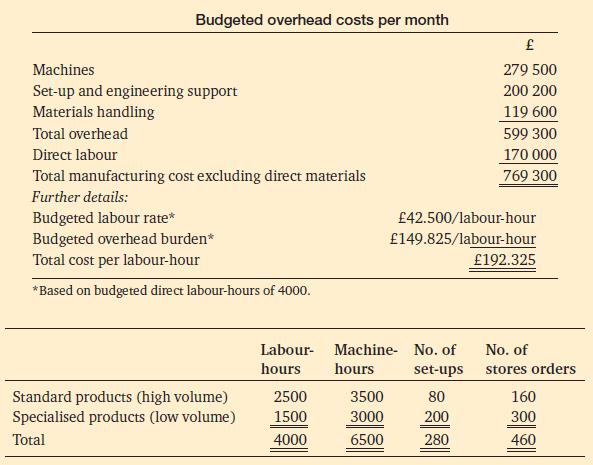This case requires students to consider the merits of activity-based costing in an altered production environment. It
Question:
This case requires students to consider the merits of activity-based costing in an altered production environment. It also deals with behavioural and organisational culture issues.
The Tankmaster Manufacturing Company, a large manufacturer of domestic oil tanks, is located in Amersham, Buckinghamshire. Since it came into existence in 1970, the company has enjoyed steady growth in both sales and profits.
Davina Tankmaster, the founder’s daughter, joined the company in 2005 after graduating with a degree in Accounting and Finance from Manchester University. One of her first tasks was to revise the costing system, as there was a need for more accurate product cost information to support the company’s strategy of offering keen prices in a highly competitive market dominated by a few large firms.
Davina had faced considerable opposition to the changes she had suggested, with several managers being willing to accept the shortcomings of the old system because they had ‘learned to live with it’. Davina won the day largely because of her father’s support as the latter was convinced that ‘learned to live with’ was a euphemism for ‘learned to manipulate to our own advantage’. Davina’s father has now retired so that Davina is now conscious of the need to prove herself.
Accordingly, the last thing she wants at present is the upset of another major change in the costing system. However, profits are below budget and the accountant is critical of the current costing system, saying that it is hopelessly out of line with the company’s updated manufacturing methods and also with current theories on product costing. He says, ‘We are still absorbing overheads on labour-hours, and we have an absurdly high overhead absorption rate of £150 per labour-hour. We are pricing ourselves out of the market on our old established products. Product costs would be more meaningful if we absorbed overheads on machine-hours.’
Davina decides she must investigate. Over the past five years, overhead costs had risen to £599,300 per month, a 46 per cent increase, while direct labour-hours have risen from £168,200 to £170,000, a negligible amount. The product processes are now largely mechanised with a relatively high level of automation. Direct labour-hours are 4,000 compared with machine-hours of 6,500 (it is possible that some labour is still being classed as direct when in fact changes in technology have altered its nature to indirect).
Davina asks the production manager about the rise in overhead costs, causing him to virtually explode: ‘How can I keep costs down when marketing ignore our standard specifications and insist on 23 different versions of every product? I need more specialist engineers to monitor the changes, and they don’t come cheap. Also there are completely new parts coming through from design with huge material costs; materials handling is a real headache. And the number of specials going through on small production runs continues to increase. I need many more set-ups per shift and that is skilled work, but you can’t pick up that sort of skilled labour easily, so overtime is through the roof.’
Davina talks to the marketing manager next: ’We are facing fierce competition for our bread-and-butter, high-volume lines and we just can’t match the low prices in the market.
However, we have successfully increased our sales of the more specialized tanks despite an increase in prices forced on us by production. So, we are meeting our overall sales targets and as we encourage this trend towards the higher margin specialist products, our profits will rise. I don’t see any problem here at present, but there will be if you don’t make production get control of the cost increases.’ Davina starts to pull the information together and gets frustrated at the inconsistencies:
‘We are meeting our sales targets, but production costs are rising because of the switch to specialist products. However, as these are sold at higher margins, we should be improving profits. I don’t understand why profits are falling.’
As Davina designed the costing system, she is reluctant to admit that it is at fault, and she remembers clearly the opposition she had when she last recommended changes. She no longer has her father to support her so that she decides to bring in a consultant (you) to help identify the problem and to advise on the necessary changes and on a suitable implementation policy. Davina supplies you with the following information:

Questions
1. Analyse the problem and give advice as to the advantages of switching to machine-hours as the overhead recovery base.
2. Show how an ABC system would change the analysis of the costs between the standard and specialist products.
3. Advise on the implementation of an ABC system. How can Davina’s fears be allayed?
Step by Step Answer:

Introduction To Management Accounting
ISBN: 9780273737551
1st Edition
Authors: Alnoor Bhimani, Charles T. Horngren, Gary L. Sundem, William O. Stratton, Jeff Schatzberg





